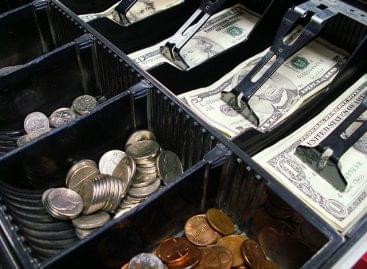In October, the economic index of the GKI decreased slightly further
According to a survey conducted by GKI Gazdaságkutató – with the support of the EU – in October, the overall expectations of the business sector did not change compared to the previous month, but consumers became slightly more pessimistic. The economic index of the GKI has been decreasing in small steps for the fourth month already, and thus fell to an eight-month low by October. The companies’ employment plans did not change significantly, but the predictability of the business environment improved considerably compared to September. The business sector’s price increase plans rose modestly, while the population’s inflation expectations did not change.
The GKI’s business confidence index did not change in October compared to September. However, within the overall picture showing stagnation, differences can be felt between the development of individual sector expectations. In the second autumn month, industrial and especially construction industry expectations improved in a monthly comparison, but at the same time, business service providers became slightly more pessimistic, and commercial companies more markedly more pessimistic. Thus, by October, trade became the most gloomy sector.
The aggregate willingness of enterprises to employ did not change significantly in the second autumn month compared to September – although it strengthened in industry, while this intention weakened in the field of services. The assessment of the predictability of the management environment improved substantially. Plans for price increases were only modest, mostly in business services. The most important obstacle to the future expansion of production and services is the lack of demand (perceived by 55% of companies). Every fourth company struggles with a labor shortage, and every fifth with financial and financing problems. The lack of raw materials and capacities bothers only 6% of the respondents.
The GKI consumer confidence index – after the significant swing in January-February – barely changed in the March-September period. With the 2-point drop in October compared to the previous month, this indicator reached its lowest point in eight months. The population assessed both the financial situation experienced in the past 12 months and expectations for the next 12 months as deteriorating compared to September, and the country’s economic situation in the next 12 months as deteriorating. The perception of own money that can be spent on high-value consumer goods has hardly changed. The population’s inflation expectations and the outlook for the expected development of the number of unemployed have not changed significantly compared to the previous month.
Related news
GKI analysis: Why do Hungarian households live more poorly than anyone else in the EU?
Imagine that the residents of every EU country shop in…
Read more >K&H Analyst Commentary: The forint is on the rise
The forint, the Polish zloty and the Czech koruna are…
Read more >Fitch: Global economy recovering as tariff war eases – China and US may drive growth
Fitch Ratings expects stronger-than-expected economic performance in 2025: according to…
Read more >Related news
Corporate leaders’ commitment to sustainability at record level
According to the latest data from the K&H Sustainability Index,…
Read more >FAO food price index rose slightly in June due to higher prices of meat, dairy products and vegetable oils
The Food and Agriculture Organization of the United Nations (FAO)…
Read more >What can cause the price of a wine to increase tenfold?
There are fewer of them worldwide than the number of…
Read more >






